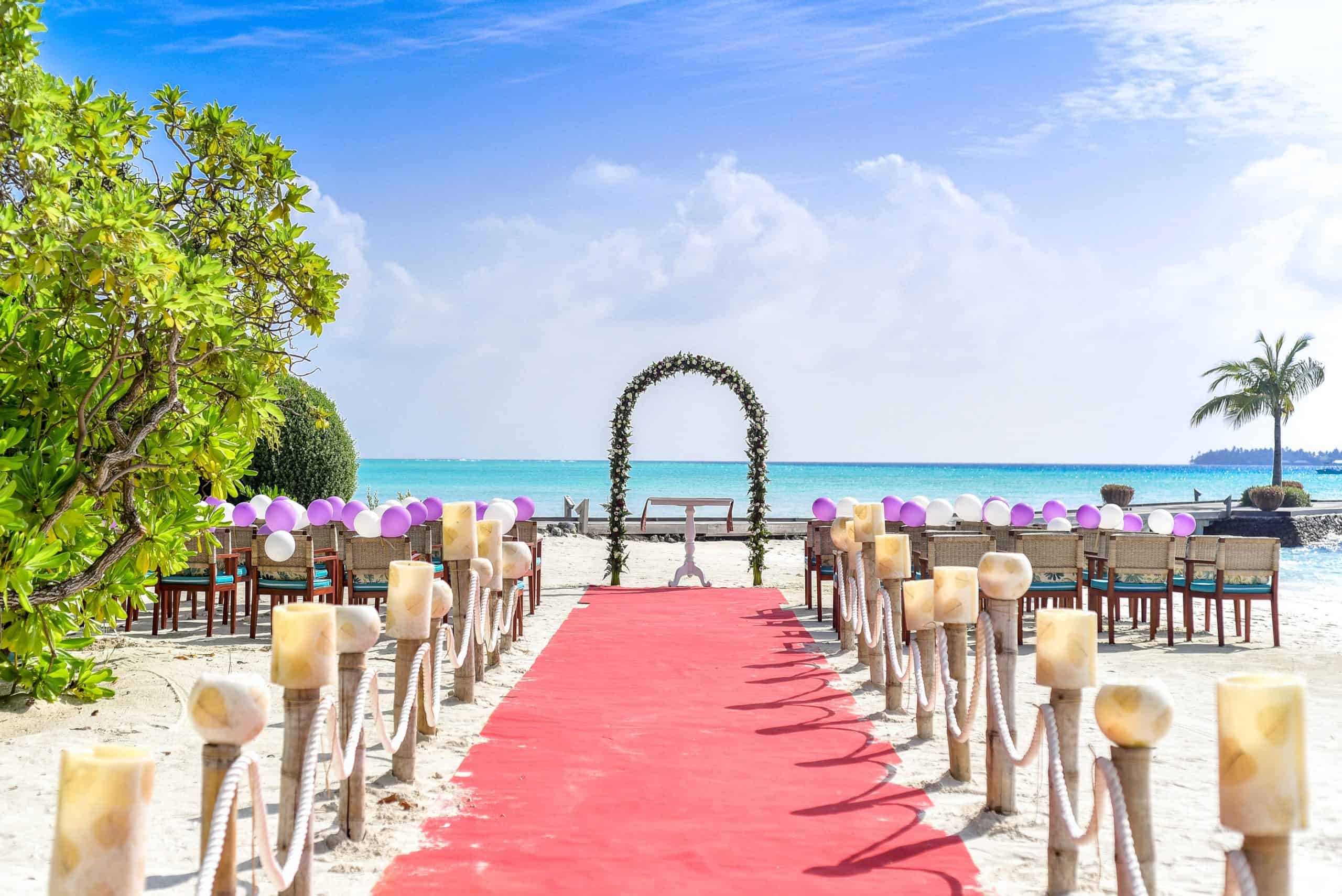Planning a destination wedding is an exciting adventure that offers the chance for a unique celebration in an extraordinary location.
Whether you’re dreaming of exchanging vows on a sandy beach, in a grand castle, or with a city skyline in the background, the planning process requires careful thought.
Destination weddings can be more complex than traditional ones, so it’s essential to approach the process with a solid plan in place.
This guide will walk you through everything you need to know to ensure your destination wedding is a success.
Let’s get straight to the point
Planning a destination wedding involves careful consideration of the location, timing, budget, and guest experience.
Choose a venue that reflects your style, visit it in person, and ensure you understand local travel and legal requirements.
Book early, avoid peak seasons to save costs, and communicate clearly with your guests by sending save-the-dates and providing travel information.
Hiring a local wedding planner can ease the process while keeping guests comfortable with welcome bags and organised activities that enhance their experience.
Be prepared for weather conditions, plan attire accordingly, and stay organised for a smooth and memorable wedding.
1. Pick the Perfect Location
Choosing the right destination is one of the most important decisions you’ll make when planning your wedding. The location will influence the style, atmosphere, and even the logistics of your big day. Here are some tips to help you decide:
- Reflect on Past Travels: Think about trips you’ve taken as a couple and consider places that were particularly memorable. Was it the climate, the local culture, or the breathtaking scenery that captured your heart?
- Visit in Person: Before finalising your decision, it’s crucial to visit the destination to see the venue and accommodations firsthand. Verify that the facilities meet your expectations and check out nearby amenities and transportation options for guests.
- Check Local Laws: Make sure you understand any legal requirements for getting married in your chosen destination, such as marriage licenses or residency requirements.
2. Check Travel and Legal Requirements
To avoid surprises, make sure both you and your guests are prepared for any travel and legal hurdles.
- Passports and Visas: Ensure that everyone, including guests, has valid passports and visas if required.
- Local Laws: Research the destination’s legal requirements for marriage. Some countries have residency rules, or you may need to bring certain documents.
- Travel Advisories: Stay updated on any travel warnings or health risks in the area, as well as local events that could interfere with your plans.
3. Timing is Everything
The timing of your destination wedding can significantly impact the overall experience for you and your guests. Here’s how to manage your schedule wisely:
- Avoid Peak Seasons: Booking your wedding during off-peak times can save money and reduce stress. Off-season weddings often come with lower prices and fewer crowds, giving you more options for venues and activities.
- Book Early: Secure your venue, accommodations, and travel arrangements as early as possible, especially if you’re planning during a busy season.
4. Set a Realistic Budget
Destination weddings can be expensive, so it’s important to create a realistic budget that includes all necessary expenses:
- Venue and Accommodation: Account for the cost of both the ceremony and reception venues, along with accommodations for you, close family members, and possibly guests.
- Travel Expenses: Factor in airfare and transportation costs for you and any key people such as family or wedding vendors.
- Unexpected Costs: Plan for last-minute expenses, such as additional travel or unforeseen changes to your plans.
5. Consider Hiring a Wedding Planner
Planning a wedding in a different location can be overwhelming, especially if you’re unfamiliar with the area. Hiring a local wedding planner can make the process much smoother:
- Local Knowledge: A local planner can recommend trusted vendors, help you with contracts, and handle logistics like scheduling and event management.
- Problem-Solving: Should any issues arise, a local planner will know how to address them efficiently.
6. Manage Guest Expectations
A destination wedding often means guests will be traveling from far away, so it’s essential to help them plan and budget.
- Send Save-the-Dates Early: Give your guests plenty of notice by sending save-the-date cards 10-12 months before the wedding.
- Provide Detailed Information: Share a wedding website or information packet with key details, such as the location, travel options, and accommodation recommendations.
7. Plan for Guest Comfort
Making sure your guests feel comfortable and welcome can enhance their experience and leave lasting memories.
- Welcome Bags: Prepare small welcome bags with local treats, useful items like maps or sunscreen, and a schedule of events.
- Guest Activities: Consider organising tours or group activities to keep guests entertained during their stay.
8. Be Prepared for the Weather
Destination weddings often take place outdoors, so be prepared for potential weather challenges:
- Rain Plans: Have a backup indoor option if you’re planning an outdoor ceremony.
- Heat and Sun Protection: For hot climates, consider providing fans, shaded areas, or cold drinks to keep guests comfortable.
9. Plan Your Wedding Attire Wisely
Your attire should match the location and weather of your wedding destination:
- Beach Weddings: Opt for lightweight, breathable fabrics that will keep you cool in the heat.
- Mountain Weddings: Choose attire that can be layered to stay warm in cooler temperatures.
- City Weddings: Reflect the local fashion and dress code while ensuring your outfit is comfortable for the expected climate.
10. Be Decisive and Stay Organised
Effective planning is key to a successful destination wedding. To ensure everything runs smoothly:
- Prepare in Advance: Complete as much of the planning as possible through phone calls or emails before your trips to the location.
- Send Invitations Early: After the save-the-date cards, send formal invitations around 4-5 months before the wedding to give your guests enough time to plan and RSVP.
Conclusion
With proper planning and attention to detail, a destination wedding can offer a beautiful, unique, and unforgettable experience for both you and your guests.
From choosing the right location to managing travel and legal requirements, setting a realistic budget, and ensuring guest comfort, every step contributes to making your special day a success.
Following this guide will help you navigate the complexities of planning a wedding in a far-off location, resulting in a memorable celebration that you and your loved ones will cherish for years to come.
Frequently Asked Questions
Is it selfish to have a destination wedding?
No, a destination wedding is not objectively selfish. A couple has the right to choose when and where they would like to be married.
However, it is deemed selfish to shame guests or to make them feel bad for not being able to afford to attend one’s destination wedding.
How long do guests stay at a destination wedding?
Most often, destination wedding guests will remain on-site for a few days to participate in all of the wedding activities and the big day itself.
Some may decide to either stay a few more days or head to a different nearby hotel to have their mini vacation, so this works out perfectly for everyone!
Is it cheaper to do a destination wedding?
Yes, you read that right-CHEAPER! Destination weddings aren’t just for those with big money. 1 in 4 brides have a destination wedding and pay for it themselves! The average cost of a destination wedding is $20,000, far less than the national average for traditional weddings.
How much time do you need to plan a destination wedding?
The average time that couples plan their destination wedding is around a year and a half, with wedding planners claiming that anytime before two years is best to get a head start on organizing your special day abroad.
Are destination weddings hard to plan?
Having a destination wedding miles away from home means you’re in for a much more intimate ceremony and can enjoy a two-for-one wedding and honeymoon. However, planning such an event is no easy feat.



